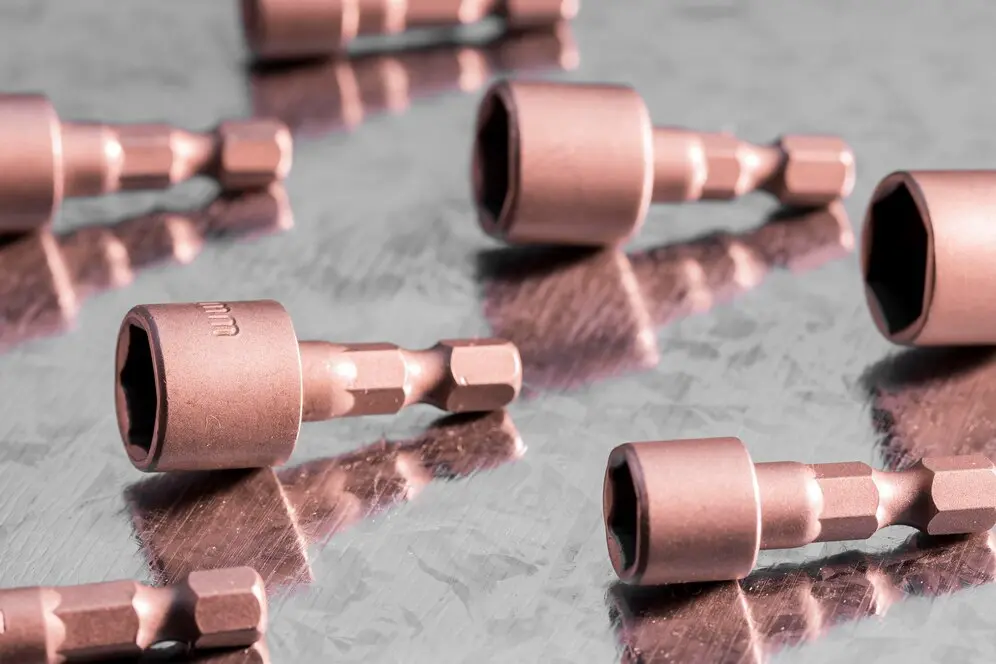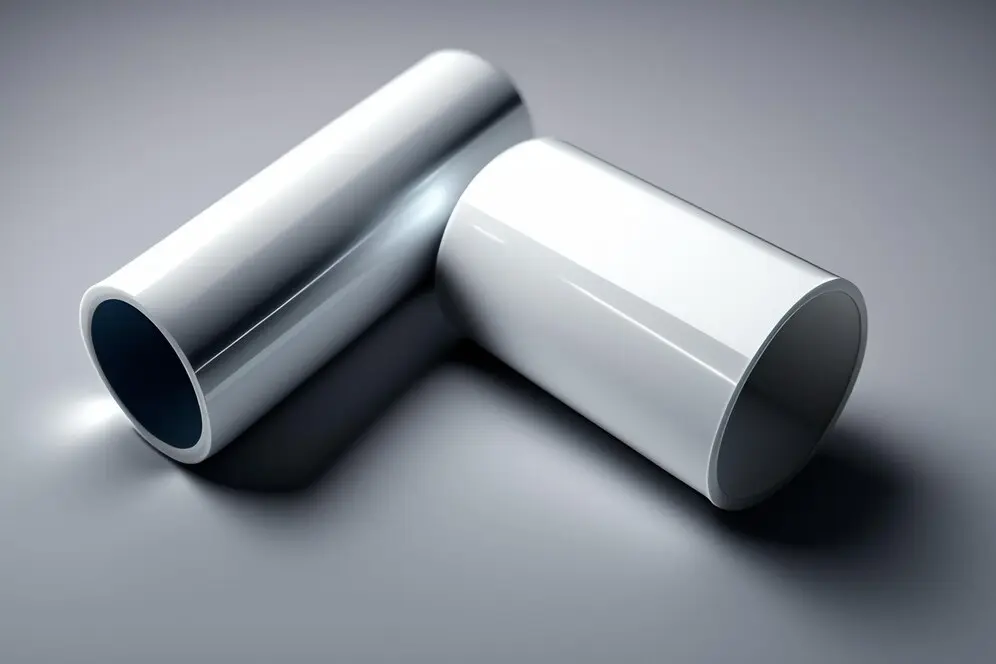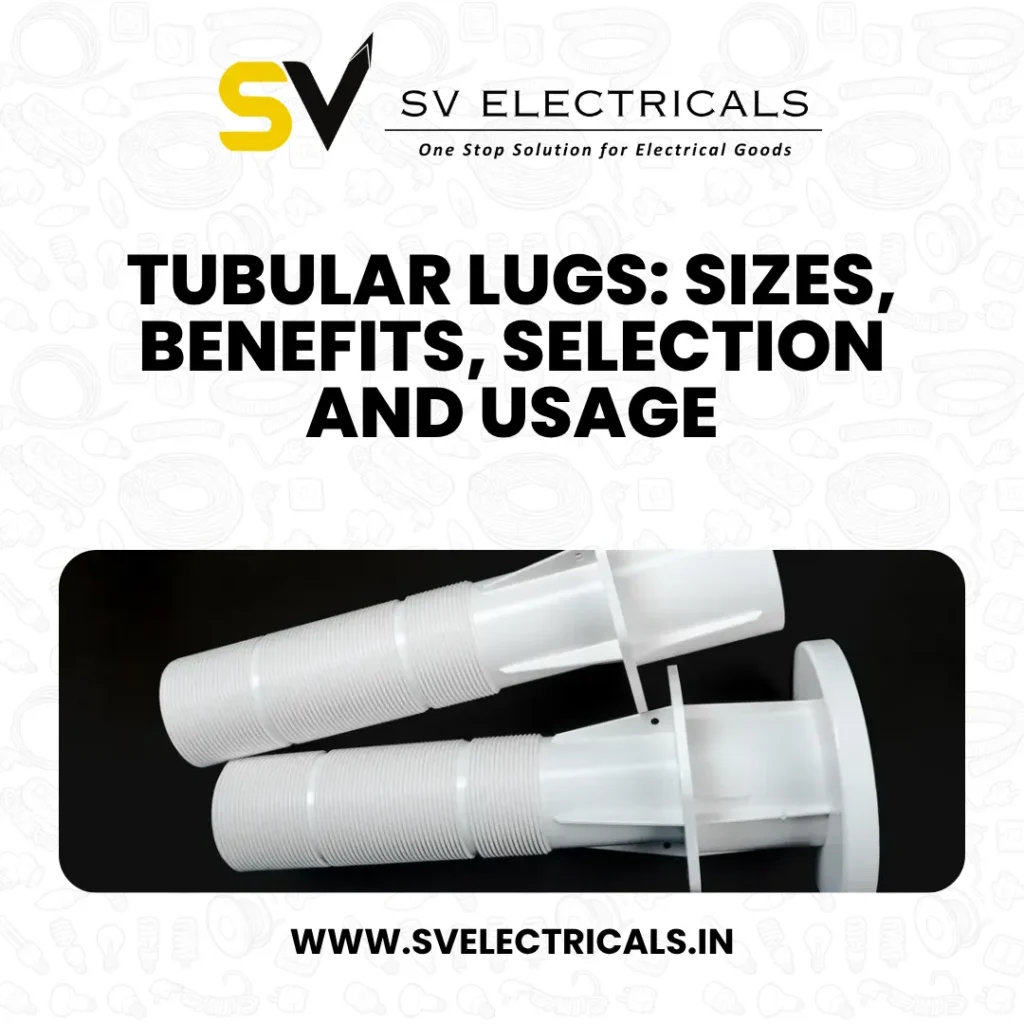Tubular lugs are essential components used in electrical connections, providing safe and reliable conductivity. These lugs are commonly used to connect cables to electrical devices, ensuring a strong and secure connection. To ensure proper installation, a tubular lug crimping tool is typically used, which guarantees a strong, durable connection.
What Are Tubular Lugs?
Tubular lugs are typically made of copper or aluminum, tubular lugs serve as a medium to transfer electrical current efficiently while ensuring that connections are secure, stable, and long-lasting.
They are widely used in various industrial and household electrical setups.
Design and Crimping of Tubular Lugs for Secure Connections
The process of securing tubular lugs to a cable involves crimping, a method that compresses the lug onto the conductor, creating a strong mechanical bond and ensuring efficient electrical conductivity.
To ensure proper crimping, a tubular lug crimping tool is used. This tool applies precise pressure to tightly press the lug around the cable, reducing the risk of a loose connection, which can lead to electrical failure or overheating.
There are different types of tubular lugs designed for specific uses. For example:
- Copper tubular lugs are widely used due to their high conductivity and corrosion resistance, making them suitable for both industrial and household wiring.
- Tubular type lugs refer to the general category, while pin type tubular lugs have expanded pin shapes, making them easier to insert into terminal blocks or electrical devices.
Applications of Tubular Lugs in Industrial and Home Electrical Setups
Tubular lugs are used in a wide range of electrical applications, from large industrial installations to everyday household wiring.
Their ability to create strong and secure electrical connections makes them ideal for use in:
- Power distribution systems, where they are used to connect heavy-duty cables to circuit breakers, transformers, and electrical panels.
- Motor connections in industrial machinery, ensuring reliable power delivery and reducing the risk of loose connections.
- Renewable energy systems, including solar panels and wind turbines, where stable connections are crucial for energy efficiency.
- Household electrical setups, such as connecting wiring to switches, sockets, and lighting fixtures.
What Are Tubular Lugs Used For In Electrical Installations?
Tubular lugs are essential components used in electrical installations to connect wires or cables to electrical devices, terminals, or power distribution systems.
These lugs are designed to create a secure and stable connection, ensuring that electricity flows safely and efficiently through the system.
Primary Uses of Tubular Lugs
Tubular lugs are primarily used in electrical installations for the following:
- Connecting cables to terminals: Tubular lugs provide a secure connection between electrical cables and terminals, ensuring that wiring remains stable and efficient even under heavy loads.
- Terminate high-voltage cables: In industrial and commercial settings, tubular cable lugs are commonly used to terminate thick, high-voltage cables, which are critical to power distribution systems.
- Connecting wires to electrical devices: Tubular lugs allow wires to be securely connected to electrical panels, circuit breakers, and other devices, ensuring that the connection is durable and resistant to deterioration over time.
- Facilitates easy maintenance: Using pin type tubular lugs makes it easy to disconnect and reconnect cables during routine maintenance, as they provide a quick and reliable way to connect and detach wires.
Tubular lugs ensure durable and secure connections
- Crimping for strong connections: Tubular lugs are typically crimped onto the end of a cable using a tubular lug crimping tool.
This process ensures a strong, mechanical connection that prevents wires from loosening or disconnecting under vibration or electrical loads.
- Corrosion resistance: Corrosion resistance is important in outdoor or industrial applications where moisture or other corrosive elements are present.
- High conductivity: Copper tubular lugs are commonly used because copper provides excellent electrical conductivity, which ensures minimal power loss in the connection and efficient energy transmission.
- Various sizes: Tubular lugs range in size from small to large, accommodating various cable diameters.
This flexibility ensures that the lugs fit snugly onto the cable, creating a secure connection that reduces the risk of overheating or electrical arcing.
- Increased safety: Tubular lugs are designed to create tight, reliable connections that reduce the risk of electrical faults, which can cause equipment damage or fire.

What Are Copper Tubular Lugs?
Copper tubular lugs are electrical connectors made of high-grade copper, designed to connect and terminate cables to electrical devices.
Tubular lugs are widely used in various electrical systems to ensure safe and reliable connections between power cables and electrical terminals.
Overview of Copper Tubular Lugs and Their Benefits in Electrical Conductivity
Copper tubular design allows for better surface contact with the conductor, enhancing electrical connections and reducing the risk of overheating.
These lugs are also corrosion-resistant, making them ideal for both indoor and outdoor applications.
Copper tubular lugs are commonly used in a wide variety of applications:
- Power distribution systems: These lugs are essential in connecting cables to switchgear, transformers, and distribution panels in industrial and commercial settings.
- Electrical panel connections: Copper tubular lugs are widely used in electrical panels where safe and reliable cable terminations are required.
- Automotive and marine electrical systems: Their durability and resistance to corrosion make them ideal for vehicles, boats, and other environments exposed to harsh conditions.
- Renewable energy systems: Solar and wind power installations often use tubular cable lugs to connect power cables to inverters and battery storage systems.
Copper tubular lugs are essential components in modern electrical systems, providing safe, durable, and efficient cable connections.
What Are Pin Type Tubular Lugs?
Pin type tubular lugs are special electrical connectors that securely connect cables to electrical devices, panels, or terminals.
These lugs are widely used in industries, residential wiring, and electrical installations where a strong and reliable connection is necessary.
These lugs are popular for use in:
- Power distribution systems
- Control panels
- Industrial machinery
- Domestic electrical installations
Unique design features for specific cable types
Pin type tubular lugs are designed with several unique features to accommodate various cable types and sizes. Below are the main design elements:
- Pin-shaped terminal: The pin at one end of a pin type tubular lug is designed to fit easily into a terminal block or other device, ensuring a seamless connection.
- Tubular body: The tubular portion of the lug accommodates the cable strands, allowing for a secure crimp connection when using a tubular lug crimping tool.
- Copper or aluminum material: Copper tubular lugs are the most common due to their excellent conductivity and corrosion resistance, ensuring long-lasting and efficient electrical connections.
- Various sizes: Tubular lugs are sized to accommodate different cable thicknesses and current ratings, ensuring compatibility with a wide range of applications.
- Insulated and non-insulated versions: Depending on installation requirements, tubular cable lugs can be insulated to protect short circuits or left uninsulated for flexibility in specific industrial applications.
Benefits of using pin type tubular lugs in electrical installations
The use of pin type tubular lugs offers many benefits in various electrical systems:
- Strong electrical connection: Crimping the tubular lug to the cable ensures a strong and stable connection, reducing the risk of electrical faults and energy loss.
- Easy installation: The pin design makes for quick and easy insertion into the terminal block, saving time during installation in both industrial and domestic applications.
- Versatility: Available in various tubular lug sizes, these lugs can accommodate different cable diameters, making them adaptable for a wide range of applications.
- High Conductivity: Copper tubular lugs provide excellent electrical conductivity, reducing power loss and ensuring efficient energy transmission in connections.
- Corrosion Resistance: Made from corrosion-resistant materials, these lugs are ideal for environments where exposure to moisture or chemicals may be a concern.
- Durability: Pin type lugs offer long-lasting reliability, making them suitable for installations that demand durable and low-maintenance solutions.
- Compatibility with Crimping Tools: Using the right tubular lug crimping tool ensures that the connection between the cable and the lug is strong and secure.
- Space-saving design: The compact design of pin type tubular lugs saves space in control panels and other tight installation environments, making them ideal for modern electrical setups.

What Are The Different Sizes Of Tubular Lugs?
Tubular lugs, commonly used for connecting cables to electrical equipment, come in a variety of sizes to accommodate different wire gauges and application needs.
Understanding the available size ranges of tubular lugs, including pin type tubular lugs and copper tubular lugs, is crucial for selecting the right option for your project.
Available Size Ranges of Tubular Lugs
The sizes of tubular lugs are typically based on the cross-sectional area of the cables they are designed to terminate. Common sizes are available in both metric (mm²) and American Wire Gauge (AWG) measurements, covering a broad range of applications.
Below are the common size ranges for different types of tubular cable lugs:
- Standard Copper Tubular Lugs
Copper tubular lugs are widely used in electrical installations. Their size is measured by the cross-sectional area of the cable they accommodate, typically ranging from 1.5 mm² to 1000 mm².
- Small sizes (e.g., 1.5 mm² to 10 mm²) are used for light-duty connections.
- Medium sizes (e.g., 16 mm² to 120 mm²) are common in industrial applications.
- Large sizes (e.g., 150 mm² to 1000 mm²) are used in high-power electrical installations and infrastructure projects.
- Copper Tubular Lugs Sizes
Copper tubular lugs are often used for terminating copper cables, providing excellent conductivity and corrosion resistance.
Standard copper tubular lug sizes usually range from 0.5 mm² to 1000 mm², covering a wide array of cable thicknesses.
- Pin-Type Tubular Lugs Sizes
Pin-type tubular lugs are another variation that features a pin shape on the connecting end, allowing easy insertion into terminal blocks or connectors.
These lugs also come in various sizes, commonly ranging from 1.5 mm² to 300 mm².
When choosing the right size of tubular lug, always ensure it matches the cable size for optimal performance. Incorrect sizing can lead to poor electrical conductivity, overheating, and potential equipment failure.
How To Choose The Right Size Of Tubular Lugs?
Selecting the correct size of tubular lugs is important to ensure safe electrical connections, minimize resistance, and avoid potential hazards.
This guide will help you understand the size standards and guidelines for selecting the right tubular lugs for specific applications.
Size Standards for Tubular Lugs Based on Cable Dimensions
Tubular lugs come in various sizes, designed to match different cable sizes. To choose the right size, you need to consider the following factors:
- Cable cross-sectional area:
The lug should fit snugly on the conductor without any extra space, ensuring efficient crimping and electrical contact. For example, if the cross-sectional area of the conductor is 16 mm², you would select the lug size labeled for that cable dimension.
- Lug barrel diameter:
The barrel diameter of a tubular lug should match the diameter of the cable core.
Loose fits can result in weak connections, while tight fits can damage cable strands. Manufacturers typically provide size charts to help match cable and lug dimensions.
- Material compatibility:
Copper tubular lugs are commonly used for copper cables due to their excellent conductivity.
It is important to ensure that the lug material is compatible with the cable material to avoid galvanic corrosion or loss of efficiency.
- Crimping tool compatibility:
Proper installation requires using the correct tubular lug crimping tool.
These tools are usually designed for specific lug sizes, and using the wrong tool can result in inadequate crimping, causing the connection to fail.
Guidelines for Selecting the Right Size for Specific Applications
- Application Type:
For high-voltage or industrial applications, it is important to choose larger tubular cable lugs to handle greater electrical loads.
Pin type tubular lugs are often used in control panel wiring, while standard tubular type lugs are commonly applied in power distribution systems.
- Voltage Rating:
High-voltage systems may require larger lugs to ensure safe operation, while smaller lugs can be used in low-voltage systems.
- Environmental factors:
If the electrical installation is exposed to harsh environments such as humidity, extreme temperatures, or corrosive conditions, consider lugs with additional protective coatings.
This ensures the longevity of the connection and reduces the risk of failure.
- Lug length and design:
The length of the lug barrel can also affect your selection. Longer lugs provide more contact area and may be suitable for heavy-duty jobs, while shorter lugs can be used for lighter jobs.
Where Can You Buy Tubular Lugs In India?
If you are looking for high-quality tubular lugs in India, SV Electricals. A leading supplier of premium cable accessories, we offer a wide range of tubular lugs and related products to meet your needs.
Our Tubular Lugs Selection
SV Electricals offers a diverse range of tubular lugs, including:
- Copper Tubular Lugs: Ideal for ensuring excellent conductivity and durability.
- Pin Type Tubular Lugs: Designed for secure connections and reliability.
- Tubular Type Lugs: Versatile choice suitable for a variety of applications.
- Tubular Cable Lugs: High-quality lugs for strong cable connections.
We also offer tubular lug crimping tools to ensure accurate and reliable installation of your lugs.
Brands we sell
We are proud to offer products from top brands including Dowells, 3M, Comet, and Raychem. Each brand guarantees quality and reliability, ensuring your projects are equipped with the best materials.

What Is A Tubular Lug Crimping Tool?
A tubular lug crimping tool is a specialized tool used to create a secure and reliable connection between an electrical cable and a tubular lug.
These tools are essential in a variety of electrical and mechanical applications, ensuring that connections are both secure and efficient.
The crimping tool is designed to compress the lug around the cable, creating a tight connection that prevents electrical resistance and potential failures.
Features to Look for in a High-Quality Crimping Tool
When choosing a crimping tool for tubular lugs, consider the following features to ensure you choose a high-quality tool:
- Accuracy and Stability: Look for a tool that provides consistent crimping pressure and accurate crimping results.
- Compatibility: Make sure the crimping tool is compatible with the size of the tubular lug you plan to use.
- Durability: A high-quality crimping tool should be made from durable materials that can withstand repeated use without compromising performance.
Tools with strong, forged steel jaws are often more reliable.
- Ergonomics: Choose a tool with an ergonomic design that provides comfort during use.
Features such as cushioned handles and a well-balanced design can reduce hand fatigue and improve control.
- Adjustability: Some crimping tools offer adjustable settings to accommodate different types of tubular lugs, including pin types and tubular cable lugs.
- Ease of use: Look for tools with user-friendly features, such as ratcheting mechanisms that ensure proper crimping pressure.
- Safety features: Make sure the tool includes safety features to prevent accidental injury or damage. such as safety locks and protective guards can enhance user safety.
What Are The Unique Properties Of Tubular Cable Lugs?
Tubular cable lugs are essential components in electrical setups, providing secure and reliable connections between cables and terminals.
Their unique properties, particularly their resistance to corrosion and oxidation, make them highly suitable for a variety of applications.
Here is an in-depth look at these properties and how they contribute to their widespread use:
Resistance to corrosion and oxidation
- Corrosion resistance: Tubular cable lugs, especially those made of copper, exhibit excellent corrosion resistance.
Copper tubular lugs are often coated with protective layers, such as tin or nickel plating, which substantially increases their resistance to environmental factors.
This coating helps prevent the lug from corroding when exposed to moisture.
Benefits:
- Longevity: The lifespan of electrical connections is increased.
- Reliability: Lower risk of connection failures due to corrosion.
- Maintenance: Less maintenance is required, as there is less need for frequent checking or replacement.
- Oxidation Resistance: Electrical connections can deteriorate over time due to oxidation. Tubular lugs, especially those made from high-quality copper or aluminum, are designed to resist oxidation.
The smooth, clean surface of tubular lugs, combined with their protective coatings, minimizes the formation of oxidation layers that can hinder electrical conductivity.
Benefits:
- Enhanced Conductivity: Maintains efficient electrical conductivity by preventing oxidation.
- Stable Performance: Ensures consistent performance under various environmental conditions.
- Safety: Reduces the risk of overheating and electrical faults due to poor connections.
Contributes to Wide Use in Electrical Setups
The unique properties of tubular cable lugs, including their corrosion and oxidation resistance, play a key role in their wide use in various electrical setups:
- Versatility in Applications: This versatility makes them suitable for a wide range of applications, from residential wiring to industrial electrical systems.
Their ability to withstand harsh conditions makes them the preferred choice for both indoor and outdoor installations.
- Reliable Connections: The reliable performance of tubular cable lugs is crucial in maintaining the integrity of electrical connections.
By preventing corrosion and oxidation-related issues, tubular lugs ensure that connections remain stable and effective.
- Compatibility with Crimping Tools: Tubular lugs are compatibility allow for accurate and secure connections, increasing the overall reliability of electrical setups.
Proper crimping of tubular lugs ensures optimal contact and conductivity, which further contributes to the stability and safety of the system.
Frequently Asked Questions About Tubular Lugs
What Are Tubular Lugs?
Tubular lugs are electrical connectors used to terminate cables, ensuring secure and reliable connections. They are typically made of copper and are available in a variety of sizes and types.
How Do You Choose The Right Size Tubular Lug For Your Cable?
Select the tubular lug size that matches your cable’s diameter and current rating, and ensure compatibility with your tubular lug crimping tool for a proper fit.





